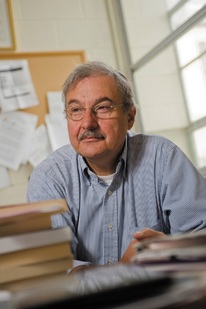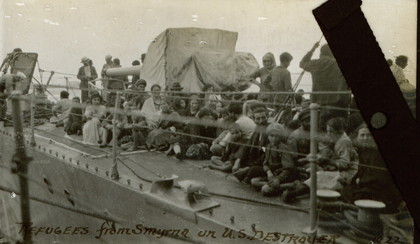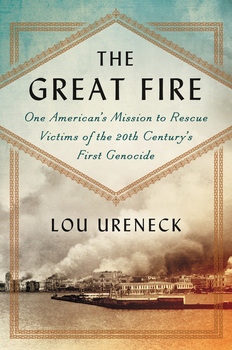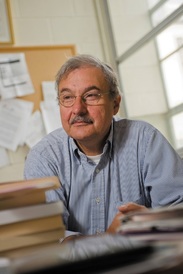Q&A with Lou Ureneck
Author of THE GREAT FIRE

What compelled you to tell this story?
I began the book because I wanted to know about Asa Jennings. He's the hero of the story. Years ago, I read a book in which his achievement was mentioned and I thought-- This is amazing, who was this man? The more I learned, the more I wanted to know. I realized that I was chasing a great American story that hardly anyone knows about it.
During your research on the book, did you encounter any particular facts that surprised you?
I was surprised by the scope of Asa Jennings' achievement, and I was surprised to learn the extent to which faith was an important force for good in America in that period of our history. There was great enthusiasm for missionary work among the country's young people. Prayer groups and revival meetings were prevalent on the campuses of the country's best colleges and universities. Young men and women traveled to places like Turkey and China to spread Christ's message and alleviate suffering among the poor. The missionary movement in Turkey, especially, was amazing for the courage demonstrated by women who went there to build and run schools and clinics.
Why do you believe this historical event is pertinent to us today?
It demonstrates the power of one individual to make a difference in the world. Asa Jennings was steeped in traditions of faith and service, and he saved hundreds of thousands of lives. It also reminds us of the genocide that was directed at Christians in Asia Minor in the early 20th Century -- the first religious cleansing in modern history.
Do you see any parallels between this story and what is happening today in the Middle East in regards to the persecution of Christians?
Yes, the genocide that swept Turkey was fueled by a fanaticism rooted in a desire to create a "Turkey for the Turks," and the principal marker of Turkishness was Islam. It was fusion of radical religious fervor with an ideology that saw Christianity as an enemy and a threat. "Holy War," or jihad, was a term applied back then as well as now.
I began the book because I wanted to know about Asa Jennings. He's the hero of the story. Years ago, I read a book in which his achievement was mentioned and I thought-- This is amazing, who was this man? The more I learned, the more I wanted to know. I realized that I was chasing a great American story that hardly anyone knows about it.
During your research on the book, did you encounter any particular facts that surprised you?
I was surprised by the scope of Asa Jennings' achievement, and I was surprised to learn the extent to which faith was an important force for good in America in that period of our history. There was great enthusiasm for missionary work among the country's young people. Prayer groups and revival meetings were prevalent on the campuses of the country's best colleges and universities. Young men and women traveled to places like Turkey and China to spread Christ's message and alleviate suffering among the poor. The missionary movement in Turkey, especially, was amazing for the courage demonstrated by women who went there to build and run schools and clinics.
Why do you believe this historical event is pertinent to us today?
It demonstrates the power of one individual to make a difference in the world. Asa Jennings was steeped in traditions of faith and service, and he saved hundreds of thousands of lives. It also reminds us of the genocide that was directed at Christians in Asia Minor in the early 20th Century -- the first religious cleansing in modern history.
Do you see any parallels between this story and what is happening today in the Middle East in regards to the persecution of Christians?
Yes, the genocide that swept Turkey was fueled by a fanaticism rooted in a desire to create a "Turkey for the Turks," and the principal marker of Turkishness was Islam. It was fusion of radical religious fervor with an ideology that saw Christianity as an enemy and a threat. "Holy War," or jihad, was a term applied back then as well as now.
 Refugees on U.S. Destroyer
Refugees on U.S. Destroyer
As you researched the hero of this story, Asa Jennings, what struck you most about him?
The scope of his achievement. His life was shaped by his faith. He grew up on a small family farm in upstate New York, worked as an itinerant minister in several small towns in the Mohawk River Valley and answered an inner call to service overseas. He suffered very bad health -- nearly every day was a trial to him. He had a bent back from tuberculosis and Potts disease, which had very nearly killed him. At a crisis point in his battle with tuberculosis, doctors told Amy Jennings, Asa’s wife, that Asa would surely die. She was heartbroken and unable to tell him right away. She opened the Bible at random and her eyes fell on a passage from the Gospel according to John that offered some hope. It was about Lazarus: "This sickness is not unto death, but for the glory of God, that the Son of God might be glorified thereby.” She read that to Asa, and continued to read it to him through his battle. When the pain that wracked his body was at its worst, together they read the Book of Job and took comfort in Job's faith.
How many people were rescued from the genocide and what events took place to facilitate their survival?
The Orthodox Patriarch at Constantinople said Jennings had saved a million lives all along the coast of Turkey. Essentially Jennings was able to gather the ships needed for a massive rescue operation. He removed a quarter million people form Smyrna alone in seven days. He acted when the Great Powers --the United States, Great Britain and France --seemed paralyzed or unwilling to get involved. They had no taste for sending their troops to Turkey. They also had designs on doing business with Turkey, and did not want to offend the Turks by intervening on behalf of Christians.
Jennings had the help of a brave U.S. naval officer from Kentucky, Halsey Powell, who was willing to endanger his career to save lives. Powell himself had grown up in a Christian household. He had gone to Centre College in Kentucky and the U.S. Naval Academy at Annapolis. Lt. Commander Powell was moved by the suffering he saw at Smyrna. He also had an instinct for rescue -- he had been decorated twice by foreign governments for his bravery and help, including the rescue of victims of a German torpedo attack on a hospital ship during WWI. He was crucial to the Jennings' evacuation. Powell used his destroyers to escort rescue ships in and out of the harbor. He also supervised the loading of refugees and negotiated terms with the Turks to allow the rescue to continue. At one point, he turned his ship's guns on Turkish soldiers who were beginning to interfere with the evacuation.
Why is this story important for Christians to revisit?
The story shows the power of faith, and the importance of compassionate service in the life of a Christian person. Jennings is a model for all of us. He overcame enormous obstacles and changed the course of history.
The scope of his achievement. His life was shaped by his faith. He grew up on a small family farm in upstate New York, worked as an itinerant minister in several small towns in the Mohawk River Valley and answered an inner call to service overseas. He suffered very bad health -- nearly every day was a trial to him. He had a bent back from tuberculosis and Potts disease, which had very nearly killed him. At a crisis point in his battle with tuberculosis, doctors told Amy Jennings, Asa’s wife, that Asa would surely die. She was heartbroken and unable to tell him right away. She opened the Bible at random and her eyes fell on a passage from the Gospel according to John that offered some hope. It was about Lazarus: "This sickness is not unto death, but for the glory of God, that the Son of God might be glorified thereby.” She read that to Asa, and continued to read it to him through his battle. When the pain that wracked his body was at its worst, together they read the Book of Job and took comfort in Job's faith.
How many people were rescued from the genocide and what events took place to facilitate their survival?
The Orthodox Patriarch at Constantinople said Jennings had saved a million lives all along the coast of Turkey. Essentially Jennings was able to gather the ships needed for a massive rescue operation. He removed a quarter million people form Smyrna alone in seven days. He acted when the Great Powers --the United States, Great Britain and France --seemed paralyzed or unwilling to get involved. They had no taste for sending their troops to Turkey. They also had designs on doing business with Turkey, and did not want to offend the Turks by intervening on behalf of Christians.
Jennings had the help of a brave U.S. naval officer from Kentucky, Halsey Powell, who was willing to endanger his career to save lives. Powell himself had grown up in a Christian household. He had gone to Centre College in Kentucky and the U.S. Naval Academy at Annapolis. Lt. Commander Powell was moved by the suffering he saw at Smyrna. He also had an instinct for rescue -- he had been decorated twice by foreign governments for his bravery and help, including the rescue of victims of a German torpedo attack on a hospital ship during WWI. He was crucial to the Jennings' evacuation. Powell used his destroyers to escort rescue ships in and out of the harbor. He also supervised the loading of refugees and negotiated terms with the Turks to allow the rescue to continue. At one point, he turned his ship's guns on Turkish soldiers who were beginning to interfere with the evacuation.
Why is this story important for Christians to revisit?
The story shows the power of faith, and the importance of compassionate service in the life of a Christian person. Jennings is a model for all of us. He overcame enormous obstacles and changed the course of history.
PRESS RELEASE:
New book details the
horrific account of the first Christian genocide of the 20th century
Author draws a definitive parallel to today’s persecution of
Christians in the Middle East

The current persecution of Christians in the Mideast has its echo in the religious cleansing that swept Asia Minor early in the last century. Over the course of ten years beginning in 1912, three million Christians were slaughtered. It was the first genocide of the 20th Century. Smyrna was a majority-Christian city inside the mostly Islamic Ottoman Empire, and its destruction was the final episode of the genocide. A small-town minister whose faith in God gave him the strength to save hundreds of thousands of lives during the Armenian genocide is at the center of a new book, THE GREAT FIRE: One American's Mission to Rescue Victims of the 20th Century's First Genocide (HarperCollins), written by critically-acclaimed author Lou Ureneck.
The book tells the story of Reverend Asa K. Jennings who arranged the evacuation of the city of Smyrna (Turkey) after it was burned and a slaughter of its Christian inhabitants was begun by the Turkish army in September 1922. The arson and slaughter at Smyrna occurred as the navies of the great powers – the United States, Great Britain, France and Italy -- stood by as neutrals.
After meticulous research into the facts of the Armenian genocide, Ureneck believes this story is one of the great humanitarian acts of history and he wanted to be sure it was told correctly.
“The story shows the power of faith, and the importance of compassionate service in the life of a Christian person,” says Ureneck. “Jennings is a model for all of us. He overcame enormous obstacles and changed the course of history. Faith and service were central to Jennings' life. He suffered a long and difficult battle with tuberculosis and Potts disease, which left him crippled and in constant pain. The Bible was his constant companion, and he turned to the book of Job for solace and comfort.”
The book tells the story of Reverend Asa K. Jennings who arranged the evacuation of the city of Smyrna (Turkey) after it was burned and a slaughter of its Christian inhabitants was begun by the Turkish army in September 1922. The arson and slaughter at Smyrna occurred as the navies of the great powers – the United States, Great Britain, France and Italy -- stood by as neutrals.
After meticulous research into the facts of the Armenian genocide, Ureneck believes this story is one of the great humanitarian acts of history and he wanted to be sure it was told correctly.
“The story shows the power of faith, and the importance of compassionate service in the life of a Christian person,” says Ureneck. “Jennings is a model for all of us. He overcame enormous obstacles and changed the course of history. Faith and service were central to Jennings' life. He suffered a long and difficult battle with tuberculosis and Potts disease, which left him crippled and in constant pain. The Bible was his constant companion, and he turned to the book of Job for solace and comfort.”

The Orthodox Patriarch at Constantinople said Jennings saved a million lives all along the coast of Turkey. With the assistance of Lt. Commander Halsey Powell, Jennings was able to gather the ships needed for a massive rescue operation. He removed a quarter million people form Smyrna alone in seven days. He acted when the United States, Great Britain and France seemed paralyzed or unwilling to get involved. They had designs on doing business with Turkey, and did not want to offend the Turks by intervening on behalf of Christians. Ureneck believes there is a clear parallel of the Armenian genocide to what is happening in the Mideast today.
“The genocide that swept Turkey was fueled by a fanaticism rooted in a desire to create a ‘Turkey for the Turks,’” Ureneck explains, “and the principal marker of Turkishness was Islam. It was fusion of radical religious fervor with an ideology that saw Christianity as an enemy and a threat. ‘Holy War,’ or jihad, was a term applied back then as well as now.”
THE GREAT FIRE recounts the burning of Smyrna -- the symbolic end of five hundred of years of Ottoman rule and ten years of religious slaughter. The book reveals forces that would define the rest of the century -- genocide, trading oil for national principles and conflict between the Christian West and Muslim East.
About Lou Ureneck:
Lou Ureneck is a professor of journalism at Boston University and directs the Business and Economics Journalism Program. Ureneck was a Nieman Fellow and editor-in-residence at Harvard University, the deputy managing editor of the Philadelphia Inquirer, and editor and vice president of the Portland Press Herald and Maine Sunday Telegram. He is the author of Backcast, which won the National Outdoor Book Award in 2007 for literary merit, and his work has appeared in numerous publications including the New York Times, International Herald Tribune, Boston Globe, and Field & Stream. He lives in Brookline, Massachusetts.
###
“The genocide that swept Turkey was fueled by a fanaticism rooted in a desire to create a ‘Turkey for the Turks,’” Ureneck explains, “and the principal marker of Turkishness was Islam. It was fusion of radical religious fervor with an ideology that saw Christianity as an enemy and a threat. ‘Holy War,’ or jihad, was a term applied back then as well as now.”
THE GREAT FIRE recounts the burning of Smyrna -- the symbolic end of five hundred of years of Ottoman rule and ten years of religious slaughter. The book reveals forces that would define the rest of the century -- genocide, trading oil for national principles and conflict between the Christian West and Muslim East.
About Lou Ureneck:
Lou Ureneck is a professor of journalism at Boston University and directs the Business and Economics Journalism Program. Ureneck was a Nieman Fellow and editor-in-residence at Harvard University, the deputy managing editor of the Philadelphia Inquirer, and editor and vice president of the Portland Press Herald and Maine Sunday Telegram. He is the author of Backcast, which won the National Outdoor Book Award in 2007 for literary merit, and his work has appeared in numerous publications including the New York Times, International Herald Tribune, Boston Globe, and Field & Stream. He lives in Brookline, Massachusetts.
###
More information on the book, visit www.SmyrnaFire.com
|